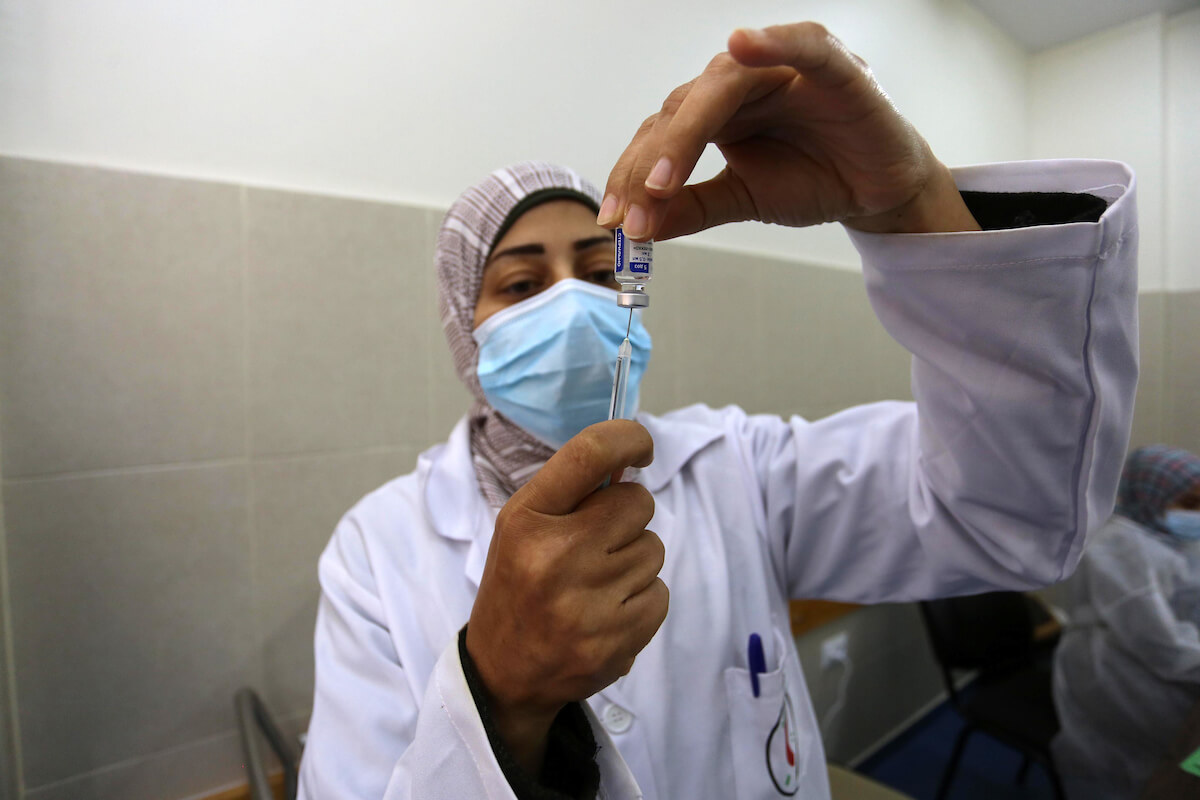
After months of delays, the Palestinian Authority (PA) began its public coronavirus vaccination campaign this week, albeit to a very slow start.
The Palestinian ministry of Health (MOH) launched the campaign after 60,000 doses of the AstraZeneca vaccine designated for the Palestinians arrived in Israel last week, through the Wolrd Heatlh Organization’s (WHO) COVAX program.
Of the 60,000 vaccines that arrived, 40,000 were sent to the West Bank and 20,000 were sent directly to the Gaza Strip.
The first doses of the COVID-19 vaccine were made available to healthcare workers and certain members of the general public in the West Bank on Sunday, including those over the age of 75, cancer patients, and those with kidney disease.
Prior to the arrival of the first COVAX shipment, Palestinian authorities in the West Bank had only received a reported 12,000 doses of the vaccine — the majority from Russia, and a few thousand from Israel — which they said were primarily used to vaccinate frontline healthcare workers.
With an estimated total of 52,000 doses having arrived in the West Bank to date, Palestinian health officials will have only been able to vaccinate some 26,000 Palestinians — around 1% of the population.
Meanwhile in the Hamas-governed Gaza Strip, health officials have received an estimated 82,000 coronavirus vaccines to date, the majority of which came as donations from the United Arab Emirates (UAE).
And while PA officials have continued to say that they are “expecting more shipments in the coming months” — a vague statement that they have been proclaiming since December — it still remains unclear exactly when that will be.
The PA is expected to receive another 400,000 AstraZeneca vaccine doses through COVAX, enough to vaccinate 20% of the Palestinian population. It has not been said whether those will be shipped at one time, or in smaller installments like the one received last week.
Additionally, the PA says it has signed a contract with the AstraZeneca pharmaceutical company for 2 million more doses of its vaccine, and is waiting on 100,000 vaccine doses from China, and 50,000 from Russia.
Palestinian Prime Minister Mohammed Shtayyeh said that the PA expects to receive the Russian and Chinese shipments by the middle of April, though many Palestinians remain skeptical about any deadlines set forth by their leaders.
In the meantime, over 100,000 Palestinian laborers in Israel were given the vaccine by the Israeli government over the past few weeks.
Reports of Palestinian ID holders with Israeli entry permits getting vaccinated at West Bank checkpoints have also surfaced in recent weeks, though the actual number of Palestinian residents in the West Bank who got Israeli-issued vaccines remains unclear.
The PA’s vaccine rollout is set to take place in four stages, according to the MOH, prioritizing those with chronic health conditions, those above the age of 60 (second phase) and 50 (third phase), and employees in certain sectors such as education, government ministries, and local municipalities.
The COVID-19 vaccine will only be fully available to the general population above the age of 18 in the fourth phase of the rollout, which could be months from now.
While the PA has celebrated the beginning of its campaign, with Prime Minister Shtayyeh saying “we are on our way to vaccinating everyone who needs and deserves a vaccine,” the rollout has been shrouded in controversy, as the Palestinian public remains vocal about their skepticism surrounding the government’s efforts so far.
Palestinian officials have failed to curb a wave of criticism from the general population, who have accused high level government and health officials of nepotism, corruption, and flat out lying to the public.
The controversy surrounding the government’s rollout began earlier this month when reports surfaced that the PA had distributed a number of vaccine doses to the upper echelons of the Palestinian government, and their families and friends.
The PA denied those claims, saying that the only government officials who received the vaccine were those over the age of 65, and that the security and staff of the President and Prime Minister’s office had also been vaccinated.
The MOH also admitted to vaccinating the Palestinian national football team in order for the team to travel out of the country for a match — a move that health officials were widely ridiculed for.
In an attempt to seemingly gain back public confidence, the PA announced through its official news agency, Wafa, that Palestinian President Mahmoud Abbas had received the first dose of the vaccine, along with a photo of the 85-year-old president getting jabbed.
The PR stunt seemed to backfire, however, as Palestinians flooded social media with the photo of Abbas, calling into question if the photo was recent, or was taken weeks ago when a number of officials over the age of 65 got vaccinated.
Palestinian social media was also flooded with posts mocking the PA after Prime Minister Shtayyeh claimed that it was in fact the PA, not Israel, who distributed hundreds of thousands of doses of the vaccine to Palestinian workers in Israel.
While the Palestinian public continues to wait for the next shipment of vaccines, which could take weeks or even months to arrive, cases in the West Bank and Gaza continue to rise, with ICU beds and ventilators across the territories at over 100% capacity.
 RSS Feed
RSS Feed















 March 24th, 2021
March 24th, 2021  Awake Goy
Awake Goy  Posted in
Posted in  Tags:
Tags: 













